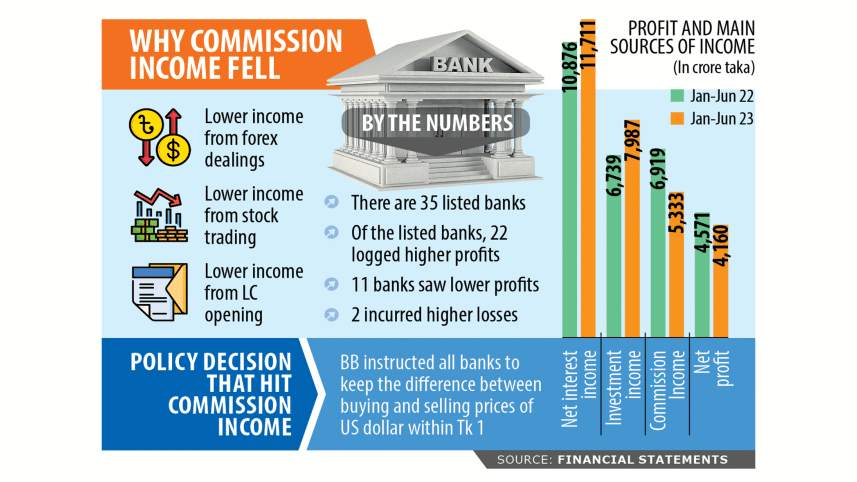Banks’ profits hit by lower income from forex market

The combined profits of 35 listed banks in Bangladesh dropped 9 percent year-on-year to Tk 4,160 crore during the first half of 2023 as volatility in the country's foreign exchange market has curbed their commissions from forex dealings.
As per their financial statements for the January-June period of the current calendar year, a majority of these lenders logged higher profits with just 13 registering reduced earnings.
However, the profit-making banks saw comparatively slow growth, allowing the loss-making ones to outpace the combined gains of the profit makers.
For example, profits of Bank Asia soared 52 percent to Tk 354 crore during the six-month period while losses of National Bank sank further by some 262 percent to Tk 626 crore.
"The banks saw their profits fall this year due to lower income from commissions and brokerage fees," said Ali Imam, managing director and CEO of Edge Asset Management.
"The amount of tax evasion is estimated to be eight times the social safety net and welfare expenditures."
The company manages assets worth about Tk 140 crore, most of which is invested in stocks, including banking scrips.
Their commission income fell as Bangladesh Bank had squeezed the spread on the purchase and sale of US dollars in a bid to reign in forex market volatility resulting from a shortage of the greenback.
In August 2022, the central bank instructed all lenders in the country to maintain a margin of Tk 1 when buying and selling the US dollar.
Imam said the brokerage fees paid to banks also came down this year as activities in the stock market have been slow due to the implications of the floor-price mechanism.
In addition, commissions from opening letters of credit (LCs) were hit as the government imposed stringent conditions for non-essential imports to stem the persisting foreign exchange crisis.
Besides, interest income, the main source of income for banks, did not compensate for lower commissions as the ceiling on interest rates stymied growth in this segment, he added.
The combined interest income grew 7 percent year-on-year to Tk 11,711 crore during the January-June period while investment income edged up 18 percent to Tk 7,987 crore at the same time.
"More importantly, the government relaxed the rules for accounting non-performing loans [NPLs]," Imam said.
But despite the move, the total value of reported NPLs has reached a significant level.
"So, NPLs are acting as a systematic threat to the whole banking sector," he added.
The second top profit-maker after Bank Asia was Islami Bank, which saw its gains for the January-June period drop 1 percent year-on-year to Tk 343 crore.
On the other hand, profits of Pubali Bank, Shahjalal Islami Bank and Jamuna Bank rose to Tk 278 crore, Tk 272 crore and Tk 256 crore respectively.
ICB Islamic Bank was the second biggest loss-maker as the lender registered losses of Tk 26 crore compared to profits of Tk 1 crore during the same period of the previous year.
Mirza Elias Uddin Ahmed, managing director and CEO of Jamuna Bank, said the banking sector is in a slightly stressed position due to high NPLs, and the gloomy business climate resulting from inflationary pressure and political tension.
NPLs in the overall banking sector stood at Tk 131,621 crore as of March 31, up 9 percent from three months back and 16 percent year-on-year, shows updated data of Bangladesh Bank.
And due to the high NPLs, banks are being denied a proper income from those loans.
Private sector credit growth also slowed as entrepreneurs are being cautious about investing for now considering the current political tension and pressure on foreign exchange reserves, he added.
Private sector credit growth hit a 15-month low of 11.1 per cent in May, the data shows.
This is because many good clients are already overburdened and do not need fresh loans as they are already facing challenges in repaying the existing ones, Ahmed said.
Regarding the lower commission income, Ahmed said reduced LC opening is to blame.
Private and public entities opened LCs amounting to $69.36 billion in fiscal 2022-23, down 26 percent year-on-year, as per central bank data.
But despite the situation, some banks that have low NPLs manged to log higher profits.
"The banking business will do better once the political tension is wiped out," Ahmed added.




 For all latest news, follow The Daily Star's Google News channel.
For all latest news, follow The Daily Star's Google News channel.
Comments